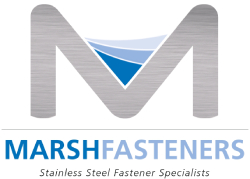Products
Stainless Steel Bolts
At Marsh Fasteners, we stock a complete line of stainless steel bolts, from stainless steel hex bolts and stainless steel lag bolts to stainless steel carriage bolts and stainless steel cap bolts. Our extensive inventory of all these categories allows us to offer you the most competitive pricing, whether you’re looking for a box or a pallet.
We stock these products in both 18-8 / 304 stainless steel and 316 stainless steel.
Please visit the individual departments for the most popular sizes of stainless steel bolts in our store, or contact us at 800 453-4642 for prompt service. When ordering, please specify if you need the stainless steel nuts or stainless steel washers with the bolts.
Stainless Steel Bolts FAQs
What Are Stainless Steel Eye Bolts Used For?
Stainless steel eye bolts are versatile fasteners commonly used in:
- Marine applications: Securely attaching ropes, cables, or chains in corrosive saltwater environments.
- Construction: Supporting structural loads or as anchor points.
- Outdoor environments: Withstanding exposure to weather without compromising strength or appearance.
What Do the Marks on the Head of a Bolt Signify?
The marks on the head of a bolt indicate its hardness and strength grade.
- No marks signify a lower-strength bolt, typically made of low-carbon steel.
- Three marks indicate a medium-strength bolt, often classified as Grade 5.
- Six marks represent a high-strength bolt, such as a Grade 8 alloy steel bolt, known for its improved tensile strength and resistance to shearing.
For stainless steel bolts, head markings typically specify the type of stainless steel, such as 304 or 316, rather than strength grade.
What Grade Are Stainless Steel Bolts?
Stainless steel bolts are most commonly manufactured in 18-8 stainless steel (304 grade) or 316 stainless steel:
- 18-8 (Type 304): This is the most commonly used grade due to its excellent corrosion resistance and high durability. It contains 18% chromium and 8% nickel, which improves its anti-rust properties.
- 316 Stainless Steel: Often referred to as marine grade, it includes additional molybdenum, which increases its resistance to saltwater corrosion, making it ideal for marine environments or coastal applications.
Both grades are non-magnetic in their annealed state, but slight magnetism may occur after cold-working (e.g., threading or machining).
What Is the Best Way to Seal Stainless Steel Bolts on Outboard Motors?
For outboard motors and other marine applications, it’s crucial to use a sealant that maintains corrosion resistance and withstands the marine environment. We recommend:
- Marine-grade silicone: This creates a flexible and waterproof seal, preventing moisture penetration.
- Marine polyurethane: Known for its durability and adhesion strength, it is suitable for sealing bolts that face continuous exposure to saltwater.
Both options help protect the fasteners from corrosion and secure the integrity of the bolted connection.
Why Do Stainless Steel Bolts Seize During Tightening?
Stainless steel bolts are prone to galling, a phenomenon where the threads seize due to friction between the mating surfaces. This occurs because stainless steel, being a soft alloy, forms a surface oxide layer that shears and cold-welds during tightening. As tightening continues, the weld strengthens, causing the bolt to seize and potentially damage the threads. Factors that increase the likelihood of seizing include:
- High tightening speeds.
- Lack of lubrication.
- Thread misalignment.
How Can I Prevent Stainless Steel Bolts From Seizing?
To reduce the risk of seizing:
- Use an anti-galling lubricant: Products such as nickel-based anti-seize compounds reduce friction and minimize galling.
- Tighten at a controlled speed: Using a lower RPM or hand-tightening helps prevent overheating and excessive friction.
- Match thread types: Ensure that bolts and nuts are from the same material and grade to minimize differences in hardness and expansion rates.
Proper preparation is essential for ensuring long-lasting and corrosion-resistant connections.
What Bolts and Screws Should I Use for Fiberglass Boats?
Fiberglass boats require fasteners that provide:
- Strength to handle the structural demands.
- Corrosion resistance to withstand exposure to moisture and salt. We recommend stainless steel fasteners (304 or 316 grades):
- 316 stainless bolts: Ideal for marine applications, offering superior resistance to rust and chemical exposure.
- Brass screws and bolts: While less common than stainless steel, brass can be an alternative for low-stress areas because of its good corrosion resistance.
Avoid galvanized fasteners, as they are prone to rust and corrosion when exposed to saltwater environments.
What Is the Difference Between 304 and 316 Stainless Steel Bolts?
The primary distinction lies in their corrosion resistance and chemical composition:
- 304 Stainless Steel: Contains 18% chromium and 8% nickel, offering excellent general-purpose corrosion resistance and tensile strength. Suitable for indoor and outdoor applications but not ideal for environments with chlorides or saltwater exposure.
- 316 Stainless Steel: Includes 2-3% molybdenum, which enhances resistance to chloride corrosion and pitting. Best suited for marine-grade applications and areas exposed to harsh chemicals.
How Is the Length of a Bolt Measured?
For most bolts, the length is measured from the point where the head sits flush with the surface to the tip of the threaded end:
- Hex bolts: Measured from under the head to the tip.
- Countersunk bolts: Measured across the entire length, including the head.
Understanding this ensures compatibility with your specific application and maintains proper structural integrity.
Do I Need Stainless Steel Nuts With My Stainless Steel Bolts?
Yes, it’s best to use stainless steel bolts and nuts together for several reasons:
- Corrosion Resistance: Both stainless steel bolts and nuts resist rust, ensuring durability in harsh conditions.
- Strength and Compatibility: Matching materials provide consistent strength and stability.
- Prevents Galvanic Corrosion: Eliminates the risk of corrosion from mixing different metals.
- Surface Protection: Washers help distribute the load evenly, preventing damage to connected materials.
For more information about our stainless steel bolts, contact us today! Our team is ready to assist you with expert advice and prompt service.
